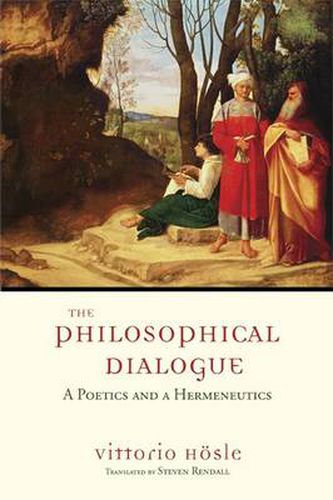Readings Newsletter
Become a Readings Member to make your shopping experience even easier.
Sign in or sign up for free!
You’re not far away from qualifying for FREE standard shipping within Australia
You’ve qualified for FREE standard shipping within Australia
The cart is loading…






This title is printed to order. This book may have been self-published. If so, we cannot guarantee the quality of the content. In the main most books will have gone through the editing process however some may not. We therefore suggest that you be aware of this before ordering this book. If in doubt check either the author or publisher’s details as we are unable to accept any returns unless they are faulty. Please contact us if you have any questions.
No overall history of the philosophical dialogue has appeared since Rudolf Hirzel’s two-volume study was published in 1895. In The Philosophical Dialogue: A Poetics and a Hermeneutics, Vittorio Hoesle covers the development of the genre from its beginning with Plato to the late twentieth-century work of Iris Murdoch and Paul Feyerabend. Hoesle presents a taxonomy and a doctrine of categories for the complex literary genre of the philosophical dialogue, focusing on the poetical laws that structure the genre, and develops hermeneutical rules for its correct interpretation.
Following an introduction that employs the categories of subjectivity and intersubjectivity to classify philosophy’s modes of expression, Hoesle’s book is structured by the classical triad of the production, inner structure, and reception of the literary dialogue. To explain what is meant by philosophical dialogue, Hoesle first deals with the specific traits of philosophical dialogue in contrast to other literary forms of philosophy and its special status among them. Second, he distinguishes the philosophical dialogue as a literary genre from actual philosophical conversation, and as a philosophical literary genre from nonphilosophical literary dialogues. Finally, he takes up the connection between literary form and philosophical content in the philosophical dialogue. Numerous authors of dialogues are discussed, with a special focus on Plato, Cicero, Augustine, Hume, and Diderot.
Originally published in Germany as Der philosophische Dialog: Eine Poetik und Hermeneutik (2006), this book not only contributes to the philosophical discussion of dialogue but to a great extent defines it. This fine translation will prove useful to both philosophers and literary critics in the English-speaking world.
$9.00 standard shipping within Australia
FREE standard shipping within Australia for orders over $100.00
Express & International shipping calculated at checkout
This title is printed to order. This book may have been self-published. If so, we cannot guarantee the quality of the content. In the main most books will have gone through the editing process however some may not. We therefore suggest that you be aware of this before ordering this book. If in doubt check either the author or publisher’s details as we are unable to accept any returns unless they are faulty. Please contact us if you have any questions.
No overall history of the philosophical dialogue has appeared since Rudolf Hirzel’s two-volume study was published in 1895. In The Philosophical Dialogue: A Poetics and a Hermeneutics, Vittorio Hoesle covers the development of the genre from its beginning with Plato to the late twentieth-century work of Iris Murdoch and Paul Feyerabend. Hoesle presents a taxonomy and a doctrine of categories for the complex literary genre of the philosophical dialogue, focusing on the poetical laws that structure the genre, and develops hermeneutical rules for its correct interpretation.
Following an introduction that employs the categories of subjectivity and intersubjectivity to classify philosophy’s modes of expression, Hoesle’s book is structured by the classical triad of the production, inner structure, and reception of the literary dialogue. To explain what is meant by philosophical dialogue, Hoesle first deals with the specific traits of philosophical dialogue in contrast to other literary forms of philosophy and its special status among them. Second, he distinguishes the philosophical dialogue as a literary genre from actual philosophical conversation, and as a philosophical literary genre from nonphilosophical literary dialogues. Finally, he takes up the connection between literary form and philosophical content in the philosophical dialogue. Numerous authors of dialogues are discussed, with a special focus on Plato, Cicero, Augustine, Hume, and Diderot.
Originally published in Germany as Der philosophische Dialog: Eine Poetik und Hermeneutik (2006), this book not only contributes to the philosophical discussion of dialogue but to a great extent defines it. This fine translation will prove useful to both philosophers and literary critics in the English-speaking world.